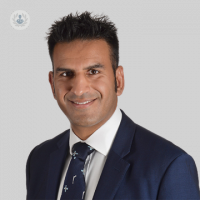Arthroplasty: how young is too young?
Written in association with:Arthroplasty, or joint replacement surgery, is rare in patients under the age of 50. Although there is no minimum age requirement for arthroplasty, more consideration has to go into whether the benefits outweigh the risk of operating, the younger a patient is. Leading Exeter-based consultant orthopaedic and trauma surgeon Mr Al-Amin Kassam explains the procedure and reasons to undergo it at a young age. He discusses when it is necessary, what the benefits are, and whether a patient is more likely to require revision surgery if arthroplasty is performed on a younger patient.

What is arthroplasty?
Arthroplasty is a surgical procedure that involves replacing all or part of the joint surface. It can be any joint, such as the shoulder, elbow, wrist or ankle, but most commonly it is the hip and knee in the lower limb.
Why might a young adult require arthroplasty?
The main reason for arthroplasty is pain and the development of arthritis. Arthritis can develop in a younger person for a multitude of reasons, either from an inflammatory disease, rheumatoid arthritis, or from post-traumatic injury which results in early onset arthritis requiring arthroplasty.
While multiple injuries and traumas to a hip joint can increase your risk of developing arthritis, the definitive cause is unknown. It depends partially on the type of trauma that occurs and how severe that trauma is. There is no rhyme or reason as to why someone would develop arthritis after experiencing trauma.
When is arthroplasty needed?
Arthroplasty is needed when the patient’s symptoms such as pain, stiffness, and reduced range of movement, starts to impact their quality of life. In these cases, the symptoms far outweigh the risks of surgery. It is the patient’s decision as to when the symptoms require surgery to improve them and maintain a good quality of life.
Is surgery the first option for young adults?
Examination is the first option; this involves taking a history and confirming that arthritis is the source of the pain. In younger patients especially there are other sources of hip pain, either from the back or from the soft tissues in and around the hip joint itself. Diagnosing the cause of the pain may require specialist scans such as X-rays, MRI scans, or CT scans. Once the cause of the pain has been confirmed as arthritis, the first treatment is non-operative management like weight loss, exercise, physiotherapy or muscle strengthening. The next approach would then be steroid injections to give some symptomatic relief. Arthroplasty is always the last resort. Once the hip has been removed, there is no going back as we cannot put your own hip back in.
What are the benefits of arthroplasty for young adults?
Following arthroplasty, the pain relief is immense. Almost immediately after the procedure, the patient is left with a pain free joint apart from the post-operative surgical pain which usually resolves once the wound has healed at 2 weeks. This allows patients to stretch out the muscles that haven’t been limited for a number of years due to arthritis. It allows patients to get back their quality of life, even returning to some sporting activities they haven’t been able to do because of the arthritis. Once the post-operative surgical pain has reduced and the wound has healed, often after two weeks, patients can maximise recovery from the hip replacement.
While arthroplasty tries to give patients the quality of life they had before the arthritis developed, it is important to remember that it is an artificial joint that is prone to fatigue and wear and tear. The result differs from patient to patient. Someone who is an office worker who goes cycling at the weekend is a very different kettle of fish to a professional sportsperson who runs ultra marathons regularly! Expectations have to be managed depending on the individual patient, but that is something an orthopaedic surgeon is quite expert in and they will council and prepare the patient for the operation.
Is a patient more likely to need revision surgery, if primary surgery happens at a younger age?
Younger patients have to live with their hip replacements for a longer time than a more elderly patient, making them more likely to require revision surgery. Thanks to an improvement in the components used, hip replacements are lasting longer now than ever before. In Exeter we have looked at our results and we know that 90 to 95% of hip replacements performed here last 25 years or more. This will, hopefully, reduce the number of redo surgeries that a patient may require. About 20 years ago, patients were often told that if they were younger than 50, they would need at least two operations on their hip replacement in their life time. We’ve now reached a point where hip replacements last a much longer time and if performed at a younger age, patients may only need one re-operation if any at all.
If you are interested in hearing more about arthroplasty, or other options, and would like to book a consultation with Mr Al-Amin Kassam, you can do so via his Top Doctors profile


